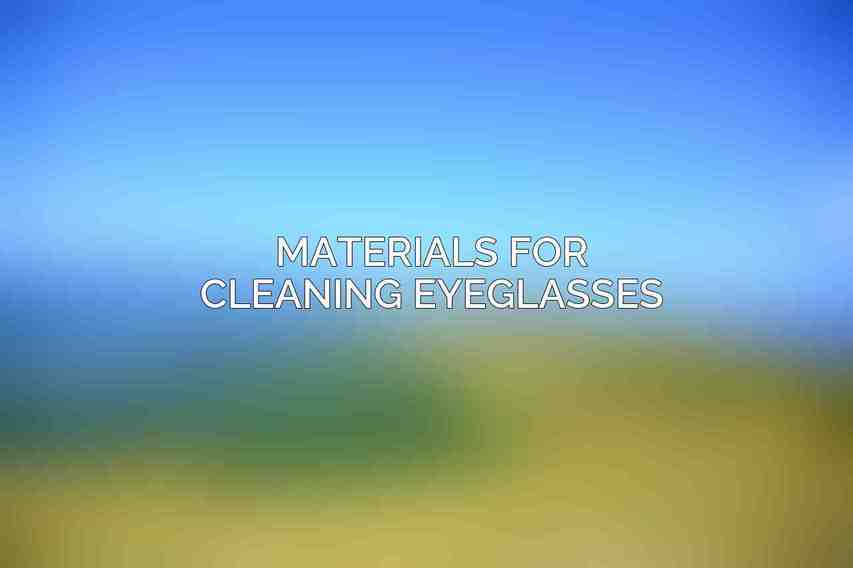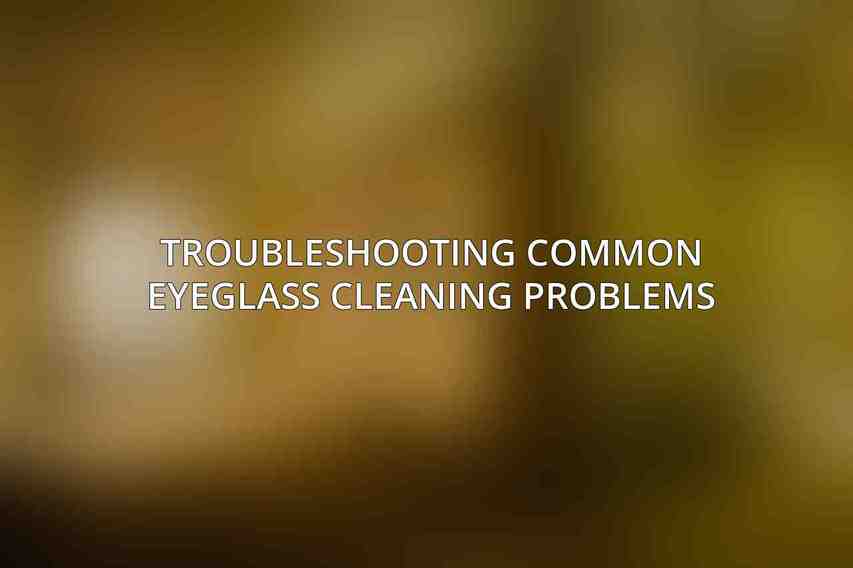Eyeglasses are essential for clear vision, but they can quickly accumulate dirt, oils, and debris that hinder your sight. Proper cleaning not only improves your ability to see clearly but also extends the lifespan of your eyewear. In this comprehensive guide, we will explore the best methods and materials for cleaning your eyeglasses effectively.
Materials for Cleaning Eyeglasses

When it comes to cleaning your eyeglasses, having the right materials is crucial to ensure a thorough and safe cleaning process. There are various options available, ranging from commercial eyeglass cleaning solutions to DIY alternatives.
Commercial Eyeglass Cleaning Solutions
Pre-moistened wipes
- Wipes designed specifically for eyeglasses are convenient for quick cleanups.
- Alcohol-based wipes can be effective but should be used with caution on certain lens coatings.
Spray cleaners
- Look for gentle formulas designed for delicate lenses.
- Some cleaners come with anti-fog or anti-static properties for added benefits.
DIY Eyeglass Cleaning Solutions
Dish soap and water
- Mix a few drops of mild dish soap in warm water.
- Avoid using harsh detergents that can damage lens coatings.
Isopropyl alcohol (70% or higher)
- Dilute alcohol with water in a 1:1 ratio.
- Use sparingly to avoid potential damage to lenses.
White vinegar and water
- Mix equal parts of white vinegar and water.
- Use a soft cloth for wiping to prevent scratches.
Step-by-Step Cleaning Instructions
Properly cleaning your eyeglasses involves a systematic approach to ensure thorough removal of dirt and oils without damaging the lenses.
A. Remove Loose Debris
- Gently blow or brush away any loose dust or dirt.
- Use a microfiber cloth or lens brush to eliminate remaining debris.
B. Wet Cleaning
- Use pre-moistened wipes or apply the cleaning solution to a microfiber cloth.
- Gently wipe both sides of the lenses in a circular motion to remove smudges and oils.
C. Rinse (If Using DIY Solution)
- If using dish soap or vinegar solution, rinse the lenses thoroughly with clean water.
- Use a clean microfiber cloth to absorb excess water and prevent water spots.
D. Dry
- Pat dry the lenses using a clean microfiber cloth or lens cloth.
- Avoid using paper towels or tissues that can leave lint behind.
Troubleshooting Common Eyeglass Cleaning Problems

Even with regular cleaning, certain issues may arise with your eyeglasses. Here are solutions to common cleaning problems you may encounter:
A. Scratched Lenses
- Consider using a commercial scratch repair kit for minor scratches.
- For extensive damage, consult an optician for professional assistance.
B. Foggy Lenses
- Use anti-fog sprays or wipes to prevent fogging.
- Clean lenses with a slightly damp microfiber cloth and isopropyl alcohol for clearer vision.
C. Oily or Greasy Lenses
- Opt for commercial eyeglass cleaners tailored for oily lenses.
- Wipe lenses gently with a microfiber cloth dampened with a degreasing solution like rubbing alcohol.
D. Discolored or Yellowed Lenses
- Try using a hydrogen peroxide solution (3% concentration or less) to brighten lenses.
- For stubborn discoloration, seek professional cleaning or lens replacement from an optician.
Maintaining Clean Eyeglasses
In addition to regular cleaning, maintaining clean eyeglasses involves proper storage and occasional professional care to ensure optimal vision and longevity.
A. Regular Cleaning
- Clean your eyeglasses daily or as needed to prevent buildup.
- Use a soft microfiber cloth or lens brush to avoid scratches during cleaning.
B. Proper Storage
- Store your eyeglasses in a protective case when not in use.
- Avoid exposing them to excessive heat or direct sunlight, which can damage the frames and lenses.
C. Professional Cleaning
- Visit an optician or optometrist for a professional cleaning every few months.
- Consider using ultrasonic cleaners for deep-seated dirt and debris removal to maintain optical clarity.
By following these comprehensive guidelines and best practices for cleaning and maintaining your eyeglasses, you can enjoy clear vision and prolong the life of your eyewear. Remember, a little care goes a long way in keeping your eyeglasses in top condition.
For more information and products related to eyeglass care, visit Eyeglass Cleaning Products.
Frequently Asked Questions
How often should I clean my eyeglasses?
It is recommended to clean your eyeglasses daily to prevent the buildup of dirt, oils, and debris.
What is the best way to clean my eyeglasses?
The best way to clean your eyeglasses is by using a mild soap and water solution with a soft, lint-free cloth. Avoid using harsh chemicals or paper towels as they can damage the lenses.
Can I use household cleaning products to clean my eyeglasses?
It is not recommended to use household cleaning products such as ammonia-based cleaners, vinegar, or window cleaning solutions, as they can damage the coatings on your lenses.
Is it safe to clean my eyeglasses with hot water?
It is best to clean your eyeglasses with lukewarm water, as hot water can cause damage to the lenses and frames.
Should I use a microfiber cloth to clean my eyeglasses?
Yes, a microfiber cloth is ideal for cleaning your eyeglasses as it is gentle on the lenses and helps prevent scratching.

